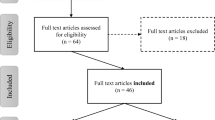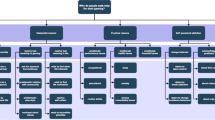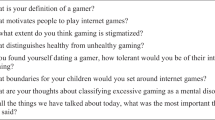Abstract
With the recent edition of Gaming Disorder to the ICD-11, it is imperative for clinicians to explore avenues to treat individuals who may seek treatment for videogame-related difficulties. An important factor in treating addictive behavior disorders is to select adaptive, appropriate replacement behaviors. Thus, this study explored typical non-gaming-related activities enjoyed by gamers as predicted by their gaming interests, with a goal of predicting targeted replacement behaviors based on gamer motivations. Online data were collected for 216 participants. Each participant completed a Gamer Motivation Profile and a General Interests Profile, and multiple regression analyses were conducted to test the degree to which gaming motivations also predicted interest in other, non-gaming-related activities. A number of significant, meaningful results emerged, both in positive and negative directions. For example, socially motivated gamers tended to also enjoy social activities outside of gaming, while showing decreased interest in creative activities. Similarly, immersion-oriented gamers tended to have higher interest in Intellectual activities, with decreased interest in Social activities and in Vacationing. Preliminary results revealed insights that can be used by clinicians in making targeted recommendations of replacement behaviors for problematic gamers, based on their specific Gamer Motivation Profiles.

Similar content being viewed by others
Notes
Gender was dummy coded in this case as “Female = 1” and “Not Female = 0.” However, because gender is a dichotomous, nominal variable, the values of the standardized betas for gender should not be interpreted in the same manner as they are for continuous variables.
References
Aarseth, E., Bean, A. M., Boonen, H., Carras, M. C., Coulson, M., Dias, D.,…van Rooij, A. J. (2017). Scholars’ open debate paper on the World Health Organization ICD-11 Gaming Disorder proposal. Journal of Behavioral Addictions, 6(3), 267–270.
American Psychiatric Association. (2013). Diagnostic and statistical manual of mental disorders (5th ed.). Arlington: American Psychiatric Publishing.
BBC News. (2005). South Korean dies after games session. BBC News. Retrieved from http://news.bbc.co.uk/go/pr/fr/-/2/hi/technology/4137782.stm. Accessed 27 June 2018.
Bean, A. M., Nielsen, R. K. L., van Rooij, A. J., & Ferguson, C. J. (2017). Video game addiction: The push to pathologize video games. Professional Psychology: Research and Practice, 48(5), 378–389.
Bouton, M. E. (2014). Why behavior change is difficult to sustain. Preventive Medicine, 68, 29–36. https://doi.org/10.1016/j.ypmed.2014.06.010.
Griffiths, M. D., & Meredith, A. (2009). Videogame addiction and its treatment. Journal of Contemporary Psychotherapy, 39(4), 247–253. https://doi.org/10.1007/s10879-009-9118-4.
Harris, P. A., Taylor, R., Thielke, R., Payne, J., Gonzalez, N., & Conde, J. G. (2009). Research electronic data capture (REDCap) – a metadata-driven methodology and workflow process for providing translational research informatics support. Journal of Biomedical Informatics, 42(2), 377–381.
Henry, A. (2000). Pediatric Interest Profiles. The Psychological Corporation. Retrieved 6/27/2018 from https://www.moho.uic.edu/productDetails.aspx?aid=43. Accessed 27 June 2018.
Hunt, K. & Ng, N. (2015). Man dies in Taiwan after 3-day online gaming binge. CNN. Retrieved from https://www.cnn.com/2015/01/19/world/taiwan-gamer-death/index.html. Accessed 27 June 2018.
Kardefelt-Winther, D., Heeren, A., Schimmenti, A., van Rooij, A., Maurage, P., Carras, M., … Billieux, J. (2017). How can we conceptualize behavioural addiction without pathologizing common behaviors? Addiction, 112(10), 1709–1715.
Kielhofner, G. (1995). A human model of occupation: theory and application (2nd ed.). Baltimore: Williams & Wilkins.
King, D. L., Delfabbro, P. H., Doh, Y. Y., Wu, A. M. S., Kuss, D. J., Pallesen, S., … Sakuma, H. (2018). Policy and prevention approaches for disordered and hazardous gaming and internet use: an international perspective. Prevention Science, 19(2), 233–249.
Mills, D. J., Milyavskaya, M., Heath, N. L., & Derevensky, J. L. (2017). Gaming motivation and problematic video gaming: the role of needs frustration. European Journal of Social Psychology, 48(4), 551–559. https://doi.org/10.1002/ejsp.2343.
Petry, N. M., Rehbein, F., Gentile, D. A., Lemmens, J. S., Rumpf, H. J., Möẞle, T., et al. (2014). An international consensus for assessing internet gaming disorder using the new DSM-5 approach. Addiction, 109(9), 1399–1406.
Rothman, K. J. (1990). No adjustments are needed for multiple comparisons. Epidemiology, 1, 43–46.
Spencer, R. (2007). Man dies after 7-day computer game session. The Telegraph. Retrieved from https://www.telegraph.co.uk/news/worldnews/1544131/Man-dies-after-7-day-computer-game-session.html. Accessed 27 June 2018.
World Health Organization. (2018). International classification of diseases – 11th edition (online version). Retrieved 6/27/2018 from https://icd.who.int/browse11/l-m/en. Accessed 27 June 2018.
Yee, N. (2006). Motivations for play in online games. CyberPsychology and Behavior, 9, 772–775.
Yee, N. (2014). The proteus paradox: how online games and virtual worlds change us – and how they don’t. New Haven: Yale University Press.
Yee, N., Ducheneaut, N., & Nelson, L. (2012). Online Gaming Motivations Scale: development and validation. In Proceedings of CHI 2012 (pp. 2803–2806).
Zajac, K., Ginley, M. K., Chang, R., & Petry, N. M. (2017). Treatments for Internet gaming disorder and Internet addiction: a systematic review. Psychology of Addictive Behaviors, 31(8), 979–994. https://doi.org/10.1037/adb0000315.
Author information
Authors and Affiliations
Corresponding author
Ethics declarations
Ethical Approval
The study described in this manuscript adheres to all ethical standards within the Ethics Code of the American Psychological Association. Research oversight was provided by the East Tennessee State University Institutional Review Board. A waiver of informed consent was granted by the IRB, due to the online nature of this study. Nonetheless, an informed consent page was still included in the online software used to collect data, and participants were able to electronically indicate consent prior to participating in the study.
Data were collected completely anonymously. No identifying information is included in any of the data or within the manuscript.
Conflict of Interest
The author declares that there is no conflict of interest.
Additional information
Publisher’s Note
Springer Nature remains neutral with regard to jurisdictional claims in published maps and institutional affiliations.
Electronic supplementary material
ESM 1
(PDF 530 kb)
Rights and permissions
About this article
Cite this article
Steadman, J.L. Gaming Motivations as a Guide to Treating Problematic Gaming Behaviors. J. technol. behav. sci. 4, 332–339 (2019). https://doi.org/10.1007/s41347-019-00103-z
Published:
Issue Date:
DOI: https://doi.org/10.1007/s41347-019-00103-z




